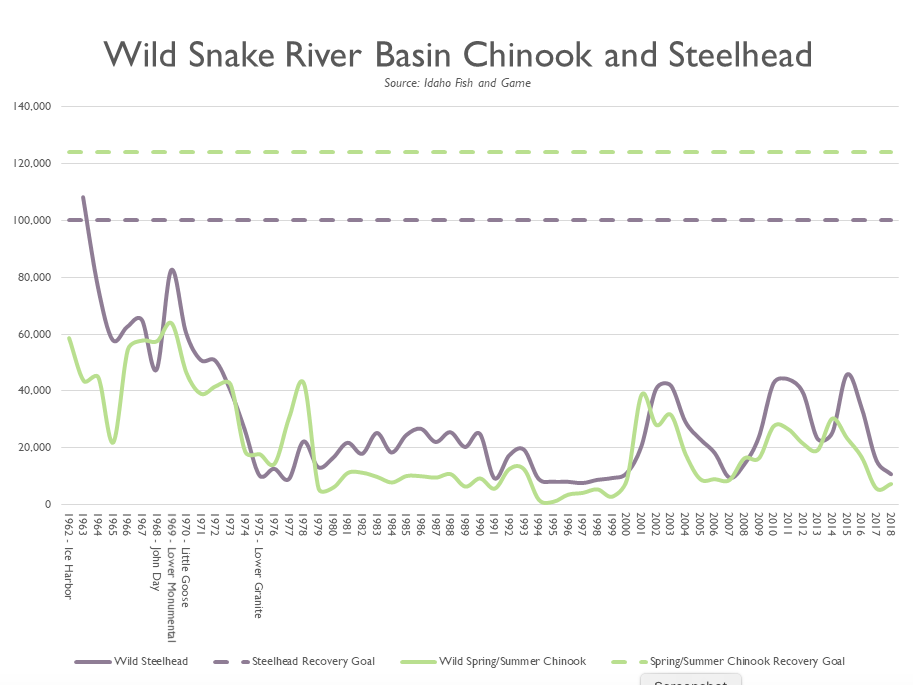forum
library
tutorial
contact

Latest Anti-Dam Study is 'Unscientific and Inaccurate.'
It Belongs in the Trash
by Editorial Board
Tri-City Herald, August 7, 2019
|
the film forum library tutorial contact |

|
Latest Anti-Dam Study is 'Unscientific and Inaccurate.'
by Editorial Board
|
 A barrage of counter arguments by various dam supporters blasted the study within days of its release, and those must continue if the report is to be completely discredited.
A barrage of counter arguments by various dam supporters blasted the study within days of its release, and those must continue if the report is to be completely discredited.
The latest anti-dam study to come out of the west side of the state is so flawed it should not be taken seriously.
Trouble is, it likely will be by those who love its message.
They will focus on the findings -- which say the benefits of removing the four lower Snake River dams exceed the costs -- and ignore the bias and bad data that was used to justify those findings.
Opposition to the report has come from the Washington Policy Center, Northwest River Partners, the Washington Association of Wheat Growers, Pacific Northwest Waterways Association, the Columbia-Snake River Irrigators Association and other groups.
The privately funded "study" was done in Seattle by ECONorthwest for another Seattle-based company, Vulcan, Inc., which oversees the business and philanthropic interests of the late Microsoft co-founder Paul Allen.
It's telling that the authors of the report acknowledge they are not experts, and that they did not independently verify the accuracy of all the information they used.
They also admit that, "Any statements nonfactual in nature constitute the authors' current opinions, which may change as more information becomes available."
This "study" is actually a promotional tool to be used to take down the Snake River dams, which might explain at least one outrageous idea suggested by the writers.
They propose that farmers and other economic "losers" from dam removal could instead get new jobs as dam-busters.
Obviously, they have no idea what the agricultural industry is all about.
Farming is not just a way to make a living -- it is in the blood.
Recommending that people who love the land could easily switch to working on a demolition crew reveals a complete ignorance of what it means to be a farmer.
Reps. Dan Newhouse and Cathy McMorris Rodgers, both R-Wash., came out hard against the report, saying, "This privately funded study is a slap in the face of our state's agricultural economy. It is another example of Seattle-based interests failing to understand our way of life in Central and Eastern Washington."
The Pacific Northwest Waterways Association -- a coalition of Northwest wheat farmers, towboat companies and others -- said the report admits carbon emissions would increase if the dams were removed, but glosses over the impact.
Todd Myers, of the Washington Policy Center, called the report unscientific and inaccurate, and pointed to slanted survey language used to justify that people would be willing pay higher electric rates to save salmon.
And Darryll Olsen, of the Irrigators Association, said the study Endangered Species Act Exemption, which would end the escalation of requirements to protect Columbia and Snake river fish runs.
It's a drastic move, but it's looking like a card that may need to be played, especially if anti-dam efforts are going to use incomplete and unreliable data to push their agenda.
Columbia-Snake River Irrigators Association
Media Release August 5, 2019 Contact Information:509-783-1623
Invoking the Endangered Species Act Exemption
For Mainstem Columbia-Snake River Hydro OperationsSo, another Lower Snake River, pro-dam breaching study, sponsored by Seattle-based Vulcan, has emerged to inform the region that the economic benefits of removing the Lower Snake River dams will exceed operating costs by about four to one. Predictably, the direct economic stakeholders immediately responded with a howl of condemnation, decrying authorship bias, poor analysis methodology, and failure to account for the "real" economic impacts of dam breaching. The CSRIA finds precious little value in tit-for-tat, he-said-she-said debate about the report--nothing changes the glide path toward breaching or drawdowns.
And equally predictable, the Columbia River System Operation agencies--the U.S. Army Corps, Bonneville Power Administration, and the U.S. Bureau of Reclamation--are stoically marching forward preparing their "new" ESA BiOp litigation Environmental Impact Statement (Draft EIS); and with blissful calm, some Congressional Representatives are reassuring us that the new BiOp EIS will be so truthfully compelling that the dams will be spared from breaching, or river pools will be saved from deep drawdowns. Are they saying this new EIS will convince the state of Oregon, Earthjustice, and various environmental groups that they too should become true dam believers? Will even U.S. District (Oregon) Judge Michael Simon have a conversion experience?
The CSRIA views this situation much differently. The Vulcan report reinforces CSRIA’s previous statement to the federal hydro agencies and direct economic stakeholders that the Draft EIS process will only serve to inflame the dam breaching-reservoir drawdown debate. Is there no "learning curve" to this 27-year litigation history lesson? It is irresponsible for the federal hydro agencies to not invoke, now, the ESA Exemption action; and it is political malpractice for pro-dam Congressional members to sit back and wait for EIS Armageddon to unfold. End the ESA litigation, engage the ESA Exemption for hydro operations.
learn more on topics covered in the film
see the video
read the script
learn the songs
discussion forum
